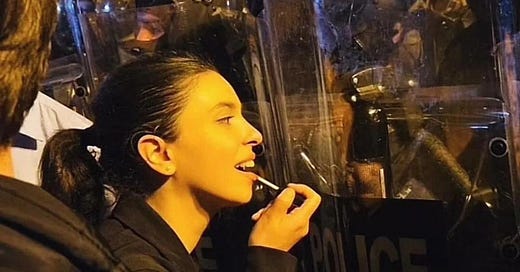Tbilisi’s Lipstick Girl On Today’s Elections In Georgia
The country of Georgia has parliamentary elections today, facing a choice between EU alignment and Russian influence.
Editor’s Note: We bring you all over the world with our reporting. Now, bring your cursor on over to the upgrade button to support us?
21 year old Ana Minadze never told her parents she was protesting.
They figured it out the hard way.
“My parents found out about my activism on TV," she recalled, laughing out loud.
Minadze had, in a single instant, become…
Keep reading with a 7-day free trial
Subscribe to The Counteroffensive with Tim Mak to keep reading this post and get 7 days of free access to the full post archives.






